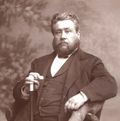In burnt offerings and sacrifices for sin thou hast had no pleasure.(Hebrews 10:6)
Then said I, Lo, I come (in the volume of the book it is written of me,) to do thy will, O God.(Hebrews 10:7)
Above when he said, Sacrifice and offering and burnt offerings and offering for sin thou wouldest not, neither hadst pleasure therein; which are offered by the law;(Hebrews 10:8)
Then said he, Lo, I come to do thy will, O God. He taketh away the first, that he may establish the second.
By the which will we are sanctified through the offering of the body of Jesus Christ once for all.(Hebrews 10:10)
And every priest standeth daily ministering and offering oftentimes the same sacrifices, which can never take away sins:(Hebrews 10:11)
But this man, after he had offered one sacrifice for sins for ever, sat down on the right hand of God;(Hebrews 10:12)
Other publications related to "Hebrews 10:9":
Hebrews 10:9 - Cross Reference
Then said I, Lo, I come (in the volume of the book it is written of me,) to do thy will, O God. (Hebrews 10:7)
For there is verily a disannulling of the commandment going before for the weakness and unprofitableness thereof. (Hebrews 7:18)
For if that first covenant had been faultless, then should no place have been sought for the second. (Hebrews 8:7)
But Christ being come an high priest of good things to come, by a greater and more perfect tabernacle, not made with hands, that is to say, not of this building; (Hebrews 9:11)
And this word, Yet once more, signifieth the removing of those things that are shaken, as of things that are made, that those things which cannot be shaken may remain. (Hebrews 12:27)

